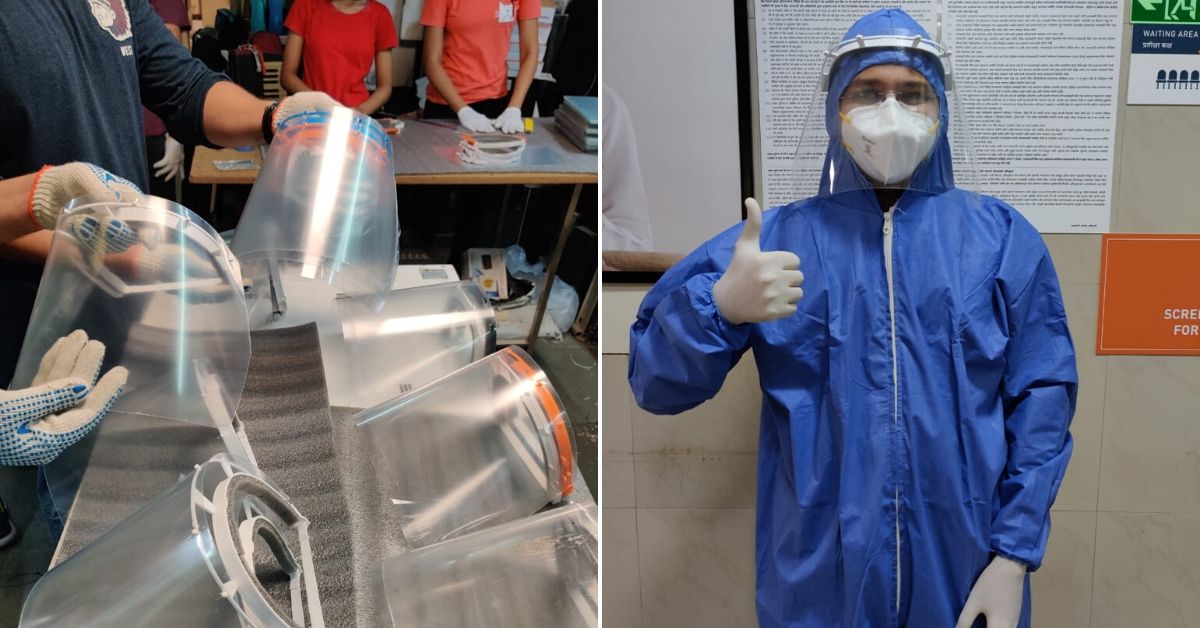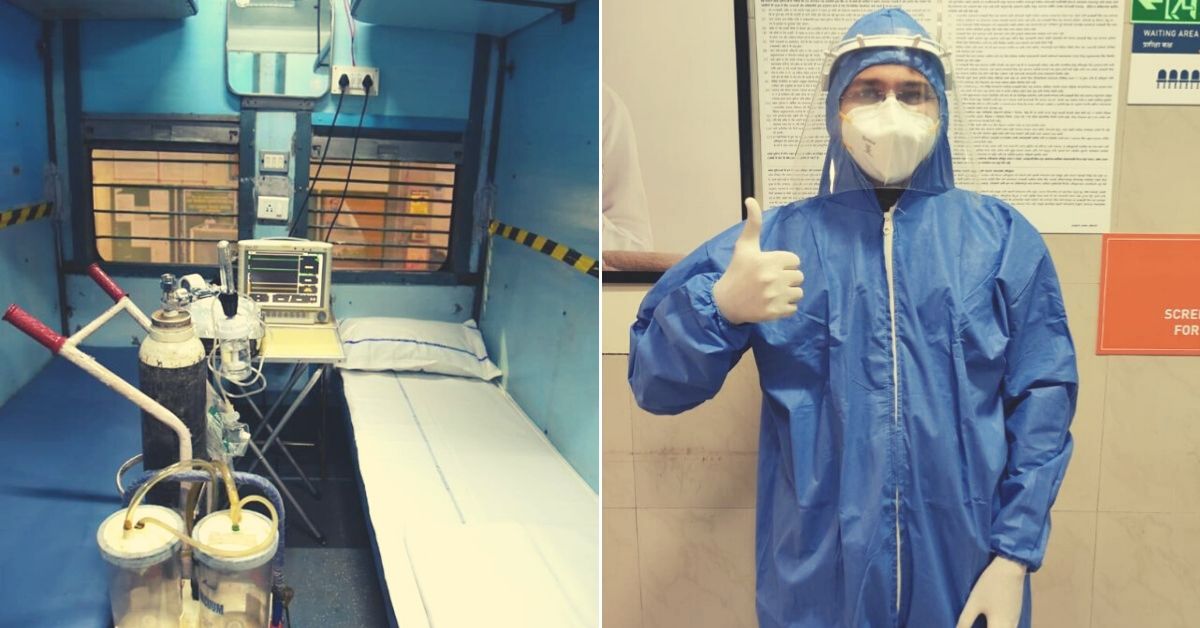Apart from all the negative implications, a crisis, particularly of the magnitude of the Coronavirus pandemic, offers fertile ground for innovations.
In India, it has compelled institutions and startups to come up with critical innovations that may one day secure us from similar scenarios in the future.
Given below are a list of 8 innovations that are yet to enter commercial production:
IIT Hyderabad-incubated Startup: Low-Cost, Portable Emergency Use Ventilator
IIT-H’s Center for Healthcare Entrepreneurship (CfHE) incubated startup Aerobiosys Innovations has developed a low-cost, portable and emergency-use ventilator called ‘Jeevan Lite’.
This device offers protection to healthcare providers, and since it is IoT-enabled, it can be operated through an app. It can also be battery-operated, enabling its deployment in areas without assured power supply.
Awaiting device certification, Aerobiosys Innovations aims to produce at least 50 to 70 units per day through collaboration with an industrial partner and plans to price Jeevan Lite at Rs 1 lakh.
IIT Roorkee: Low-cost face shields to be used by AIIMS Rishikesh
IIT Roorkee’s ‘ReThink! The Tinkering Lab’ has developed low-cost face shields for frontline health workers at AIIMS Rishikesh for protection from COVID-19. The frame of the face shield is 3D printed.
“The spectacle-type design of the protection shield provides the ease of replacement as the transparent sheet is not bound to a reusable frame,” says its press release.
The manufacturing cost per shield is approximately Rs 45. Mass manufacturing cost will be even less.

IIT Roorkee: Low-cost portable ventilator as well
IIT Roorkee has also developed a low-cost portable ventilator. Called ‘Prana-Vayu,’ the closed-loop ventilator is developed in collaboration with AIIMS, Rishikesh, and is equipped with top of the line features. The prototype has been tested successfully for normal and patient-specific breathing conditions.
“The ventilator is based on the controlled operation of the prime mover to deliver the required amount of air to the patient. The automated process controls the pressure and flow rates in the inhalation and exhalation lines. Besides, the ventilator has feedback that can control tidal volume and breathe per minute,” says its press release.
The ventilator will be suitable for patients of all age groups, especially the elderly.
IIT-Bombay: Device that sanitises currency notes, mobile phones
Researchers at IIT-Bombay have developed a portable UltraViolet Sanitiser that can disinfect currency notes, mobile phones and other small items. This can help clean surfaces as a precautionary measure against the spread of the Coronavirus.
“The sanitiser has been prepared by using stainless steel kitchen containers and aluminium mesh… So far, the team has conducted trials only inside the lab. The sanitiser was developed by Industrial Design Centre (IDC) at the institute,” reports the Financial Express.
IISc: Indigenous prototype of ventilator
While manufacturers around India are struggling to source key components like sensors and flow controllers from abroad to produce their ventilators, the Indian Institute of Science (IISc) is building one from scratch with components made in India.
Working 24/7, its indigenous electro-mechanical ventilator prototype is expected to be ready this month. The team at IISc are building it based on the guidelines issued by the UK Medicines and Healthcare products Regulatory Agency.
“We are building it so that anyone can use it free of cost,” TV Prabhakar, Principal Research Scientist at the Department of Electronic Systems Engineering (DESE) and one of the founders of the project, was quoted as saying in an IISc statement.
Indian Railways: Prototype of Isolation Ward
The Indian Railways has developed a prototype of train coaches that could soon be used as isolation units for COVID-19.
According to this Economic Times report, “10 coaches will be converted into isolation units for those affected by COVID-19, by each zonal railway every week.”
It goes on to add, “To make the isolation cabin, the middle berth has been removed from one side, while all the three berths have been removed in front of the patient berth, as per details shared by the official. There is a provision of air curtains in each compartment.”
Indian Railways: PPEs for frontline healthcare workers
In a significant development on Sunday (April 5), the Defence Research and Development Organisation cleared two samples of personal protective equipment (PPE) coveralls developed by a Northern Railways workshop. According to the Economic Times, “the test at the Defence Research and Development Organisation’s Gwalior lab was conducted to check the resistance of the bio-protective covering material (fabric/garment) to penetration of blood or body fluid.” The Northern Railways went onto add, “Now these coveralls will be manufactured by Indian Railways and will be worn by doctors in railway hospitals while treating COVID-19 patients.”
Indian Railways has taken up the in-house production of PPE type overall on a mission mode.
Facilities are being geared up in Railways to make up to 1000 protective overall for Railway Doctors & Paramedics every day. #IndiaFightsCoronahttps://t.co/fTTHTyvRAY pic.twitter.com/Vg6pLdqj4L
— Ministry of Railways (@RailMinIndia) April 7, 2020
Dozee: Medical-Grade Remote Monitoring of Vitals
Dozee, the startup behind the contact-free and smart health monitor, has responded to the epidemic by using their device for medical-grade remote monitoring of vital health indicators including respiratory rate and heart rate for vulnerable patients stuck at home, makeshift ICUs or medical facilities that are suffering from a serious shortage of personnel.
“We have been working to secure our supply chain and can meet a demand of up 100,000 devices per week although, given the demand spike, we are attempting to prioritise this for health systems dealing with large numbers of at-risk patients or where healthcare workers are scarce,” said Mudit Dandwate, CEO and co-founder at Dozee, told Economic Times.
Also Read: Fighting COVID-19: Experts Answer 5 questions We All Have About Wearing Masks
(Edited by Gayatri Mishra)
Like this story? Or have something to share? Write to us: contact@thebetterindia.com, or connect with us on Facebook and Twitter.
We bring stories straight from the heart of India, to inspire millions and create a wave of impact. Our positive movement is growing bigger everyday, and we would love for you to join it.
Please contribute whatever you can, every little penny helps our team in bringing you more stories that support dreams and spread hope.

